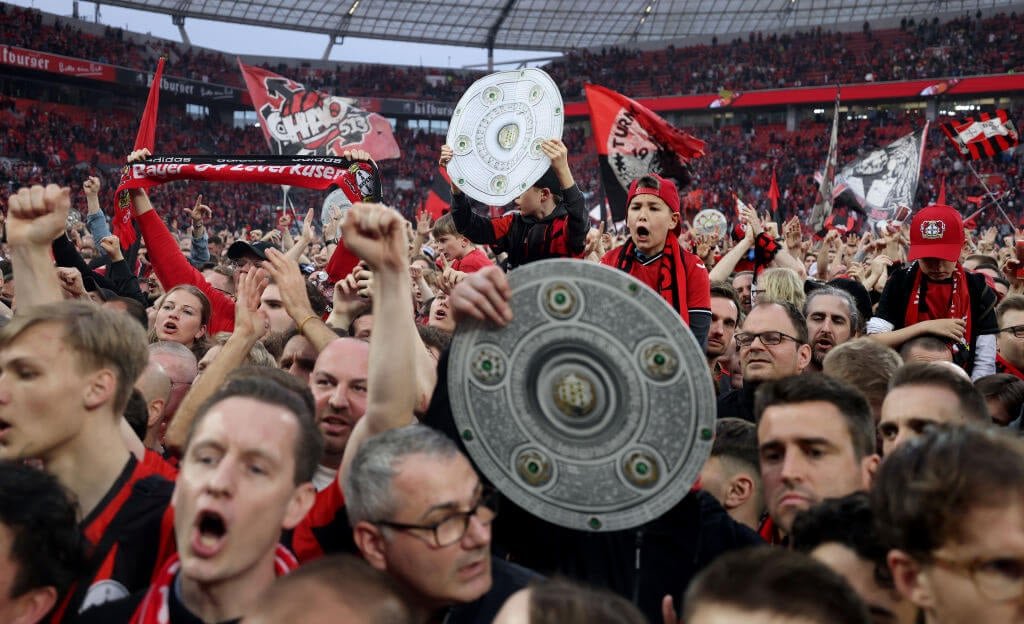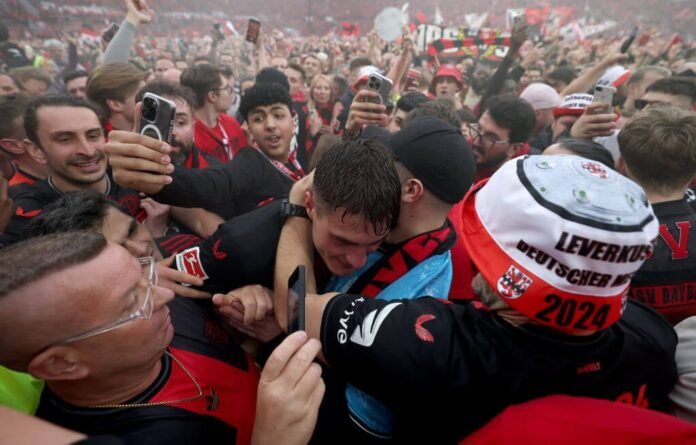They chased each other with giant beer glasses.
Victor Boniface and Edmond Tapsoba stalked their team-mates, looking for someone to drench. Bayer Leverkusen were finally Bundesliga champions and deep in the heart of the BayArena, it was chaos.
Jeremie Frimpong took refuge in a live television broadcast. Celebrations spilt from private into public, into ongoing interviews and, ultimately, into new ones. Journalists hung over the interview area railings, clawing at anybody who moved. One asked for pictures. Another wielded a replica Bundesliga trophy, asking for signatures. Xabi Alonso signed it. As he did, a hydra of reporters grasped over the barriers, fumbling at the most coveted coach in world football.
All the while, Fernando Carro, the club’s chief executive, drifted quietly around, bottle in hand, watching on like a proud uncle. Job done.
Nathan Tella floated through, looking as content and feeling as much peace as a professional athlete ever gets to. A year before, Tella had been playing in the English game’s second tier, winning Premier League promotion and the title with Burnley. Now, he was not just a champion of one of the five major European leagues but integral to one of its most powerful squads and entwined with Leverkusen performances that will be remembered for decades to come.
“It’s been surreal,” former Arsenal youngster Tella told The Athletic. “From being promoted to having the opportunity to come to the Bundesliga and now maybe win a double, or even a treble. I wouldn’t have believed it if you told me. I just want to thank everyone who has helped me on my journey — but this isn’t the end.”
Alonso blows kisses to the crowd (Lars Baron/Getty Images)
But why did it work so well? This Leverkusen team will be remembered for how many players contributed at precisely the right time. During injuries or suspensions; whenever there was a need, someone from the squad answered the call.
How does that happen?
“It’s the manager,” he said. “It’s his focus on the minor details and how they turn out to be massive details.”
Tella shuffled down the line and was in the middle of an interview when a group of his team-mates, led by Jonathan Tah, seized him away.
“He has to go now…”
Off they went, giggling, having recruited him to a group that would invade Alonso’s live press conference, soak him with another beer — the third of the night — and leave their coach dripping from to head-to-toe, live on television.
Bayer Leverkusen players douse Xabi Alonso in beer — the customary way to celebrate a Bundesliga title win 🍺
📼 @bayer04_en pic.twitter.com/FAl4h7lTF4
— The Athletic | Football (@TheAthleticFC) April 14, 2024
What a day. What a night.
At first, it was just a few fans, some beer and some songs.
Then it was dozens, then hundreds and before much longer thousands, lining the road leading to the BayArena, to wait for the players who would end a wait as long as their club’s history.
Red smoke billowed from flares. Scarfs hung from lampposts. Fans dangled from trees and bus stops. Young children were up on shoulders, with their heads in the cordite clouds.
When the Leverkusen coach arrived, it wound gently through that furnace, towards the conclusion of one of the most powerful league seasons in recent memory.
Lost in that haze were shirts bearing the names of today’s icons: Wirtz, Xhaka, Tah and almost every other member of Alonso’s side. But between them, there was Ballack and Kirsten, Kiessling and Voller; players who remain eternally popular, who achieved wonderful things for Leverkusen but without ever quite becoming champions. They were there for the day too.
Some of those players are stencilled on the outside of the BayArena, too. Look hard enough and you can also find a little collage of Leverkusen’s win over Manchester United in the semi-final of the 2002 Champions League. It’s tucked between the pipework and the steel, on one of the exterior walls.
Everybody else in the world remembers Zinedine Zidane’s volley for Real Madrid against Leverkusen at Hampden Park from that year’s final. But here, where they have been living among their yesterdays for so long, those United games are a mighty away-goals victory. Somehow, unfairly, they would become part of a trio of misfortune that spun the ‘Neverkusen’ legend.

Fans celebrate on the pitch (Lars Baron/Getty Images)
And that’s the kind of past that creates neuroses: the fear that makes fans think that a game is never over, not even three-nil up with a minute to play, the sort of experience which convinces them that football really only exists as a way for other people to laugh at them.
Not on Sunday. The path from Leverkusen station to the BayArena runs for roughly a mile along a river. Stalls sold ‘Deutscher Meister’ (German champions) 2024 T-shirts every few hundred yards and fans bought them in fistfuls. One vendor The Athletic spoke to said in broken German that he had sold over a hundred by 2pm, with the game hours away.
Maybe that was just a hard sell, but it was clear that nobody was afraid to flirt with fate. On the other side of the river, on rocks down by the water’s edge, fans drank cans in the sun and thumped generic rock from a battered stereo.
This was how good Alonso’s team have been. Nobody in Germany had an answer for Leverkusen this year. Not even Bayern, not even with Harry Kane. They have been overwhelmingly excellent in every competition and there was no sense, anywhere on Sunday, at any time, that anyone believed that Werder Bremen would not just be swatted aside.
But failing to win would still have been humiliating. The Bundesliga has been a foregone conclusion for some time, but with the build-up and the flocking journalists, the T-shirts and the stencils sprayed on pavements all over town, announcing the arrival of unseren traum (our dream), anything but a victory for Leverkusen would have been one more chance for people to point and laugh.
So, there was pressure. It just never showed.
The coach crept on, gently through the crowd. Firecrackers snapped around it, rockets burst above, and fans started following in its wake. When it arrived, Alonso and his players were met by a sign strung over one of the entrances.
“Das warten hat ein ende werdet zu legenden!” (“The wait is over, become legends!”).
They did just that. The game began with Tah marching between his team-mates, bear-hugging each in turn, and ended at Florian Wirtz’s brilliant feet. Wirtz’s first goal was exhilaratingly violent. His second brought the fans bursting through the hoardings and onto the pitch. His third completed his hat-trick and convinced that referee that, at 5-0 and with Bremen desperate to be anywhere else, it was better just to blow the whistle.

Fans line the street as the bus arrives (Ina Fassbender/AFP via Getty Images)
The crowd had had three attempts at a pitch invasion. The first two were beaten back and constrained by the disapproval of the whistling majority and the silent grip of the social contract. The third broke through, swallowing the players whole and surrounding them with pillars of flare smoke that leapt up into the night sky.
Somehow, they fought their way off the pitch, and down the tunnel.
In the interview area afterwards, amid the high jinx, there was sincerity; glimpses of football’s soul. Players did not talk about the ‘next’ game or the need not to get carried away. They spoke of gratitude instead and of what those moments meant. The game does not always show that humanity. The bigger it gets, the less of itself it reveals. But in those unguarded seconds after success, when nobody can argue with methods or mindsets, or quibble choices of words, the walls come down, just for a bit.
Xhaka sat on the floor, surrounded by his children. Patrik Schick carried his son. There were mothers standing back, watching proudly as their boys spoke eloquently to the media, taking mighty steps in their careers with dignity and class. There were fathers, brothers and sisters, with their family’s names on their replica shirts. Some wore them back-to-front, with the name across their chest. Cousins and friends snaffled pizza from the dressing room. A grandmother was drowning in a replica shirt. A grandfather was not quite sure where to go or what to do. He was bewildered to find himself at the centre of German football’s universe but seemed happy enough to be there.
It was tender and real. A privilege to watch.
Analysis of Leverkusen’s season describes the cohesion at the club and the many, many people who have contributed to this success. They were there, too. Not just the data scientists, the recruiters and the coaches, but the people whose names nobody knew — the ones who spent the season taking photographs, preparing reports, shuffling spreadsheets and reordering office supplies. Erasers and pencils, training bibs and cones. They passed back and through, with smiles, beers and hugs for anyone who wanted one.
And then everyone went outside. Back out to the crowd on the pitch, who had been punching their noise through the walls, before emerging on a balcony at the far end of the ground.
There, like emperors home from a conquest, Bayer Leverkusen stood in front of their people, to show them what was now theirs.
(Top photo: Lars Baron/Getty Images)
Read the full article here


